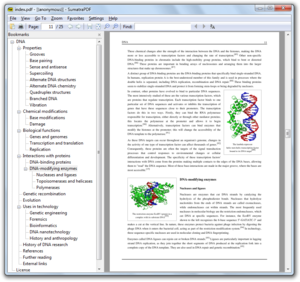Sumatra PDF
 |
|

Sumatra PDF
|
|
| Original author(s) | Krzysztof Kowalczyk |
|---|---|
| Developer(s) | Krzysztof Kowalczyk, Simon Bünzli and others |
| Initial release | 1 June 2006 |
| Stable release |
3.1.2 / 14 August 2016
|
| Repository | github |
| Written in | C++ mostly, C |
| Operating system | Windows XP and later |
| Size | 4.34 MB |
| Available in | Multilingual |
| Type | Document viewer |
| License | GNU General Public License v3 |
| Website | sumatrapdfreader |
Sumatra PDF is a free and open-source document viewer, it supports many document formats including: Portable Document Format (PDF), Microsoft Compiled HTML Help (CHM), DjVu, EPUB, FictionBook (FB2), MOBI, PRC, Open XML Paper Specification (OpenXPS, OXPS, XPS), Comic Book Archive file (CB7, CBR, CBT, CBZ). It is developed exclusively for Microsoft Windows, but it can run under Linux with help of WINE.
Sumatra has a minimalist design, with its simplicity attained at the cost of extensive features. For rendering PDFs, it uses the MuPDF library.
Sumatra was designed for portable use, as it consists of one file with no external dependencies, making it usable from an external USB drive, needing no installation. This classifies it as a portable application to read PDF, XPS, DjVu, CHM, eBooks (ePub and Mobi) and Comic Book (CBZ and CBR) formats.
As is characteristic of many portable applications, Sumatra uses little disk space. In 2009, Sumatra 1.0 had a 1.21 MB setup file, compared to Adobe Reader 9.5's 32 MB. In January, 2017, the actual version SumatraPDF 3.1.2 had a single 6.1 Mb executable file. On the other side, Adobe Reader XI uses 320 MB of disk space.
The PDF format's use restrictions were implemented in Sumatra 0.6, preventing users from printing or copying from documents that the document author restricts, a form of Digital Rights Management. Kowalczyk stated "I decided that [Sumatra] will honor PDF creator's wishes". Other open source readers like Okular and Evince make this optional, and Debian patches software to remove these restrictions, in accord with the open source principles of interoperability and reuse.
...
Wikipedia
